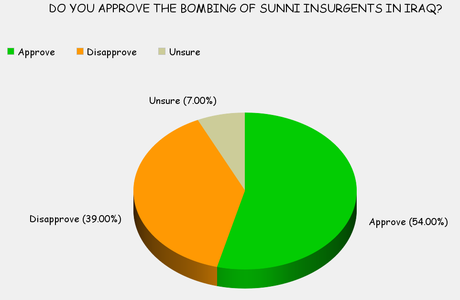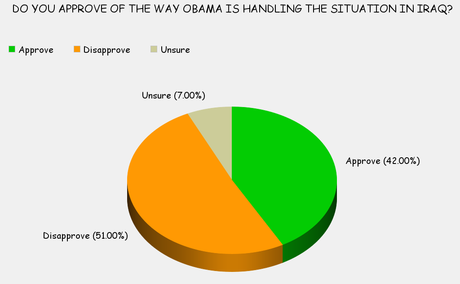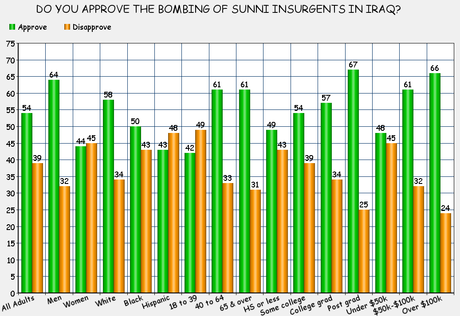

A few days ago, I presented a survey showing a majority of the American approves of the U.S. bombing campaign in Iraq. Now that has been verified by a second poll. This time it's the ABC News / Washington Post Poll -- conducted between August 13th and 17th of a random national sample of 1,025 adults, with a 3.6 point margin of error. The survey shows 54% of Americans support the bombing of the Sunni insurgents.
But while they support the bombing, a majority (51%) do not approve of President Obama's handing of the Iraqi conflict. I would have to assume that while the public doesn't mind killing Iraqis, they don't want to endanger any American soldiers while doing that. They oppose Obama's decision to put American troops back into Iraq -- more than 500 so far (supposedly to train and help with planning by Iraqi government forces, and to protect the American embassy and the airport).
The public support for the bombing has to mean that many Americans see the conflict as being between the "good" Iraqis (who must be defended) and the "bad" Iraqis (who must be killed). I think that is a rather naive view. There are no "good" or "bad" forces in Iraq -- only two religious groups that hate each other. And neither of those groups is a real ally of the United States.
Neither side is fighting for freedom or democracy. It is a religious civil war, being waged by politicized Sunnis and politicized Shiites -- and all either group wants is the ability to impose their own particular religious dogma on the country as a whole.
Most people see the Sunni insurgents as anti-American, and that is probably true. But the Shiites currently in control are no better. Their closest ally is Iran (which still consider the U.S. to be the "great Satan"), and while they make the appropriate noises to keep getting American money and arms, if push came to shove they would side with the Iranians against the U.S. -- and use the training and arms we have supplied against us.
We could not solve this religious crisis the first time we engaged in a war in Iraq (even though by invading we created the crisis), and we won't be able to solve it by re-engaging in their civil war. This can only be solved by the Iraqi people themselves. The best thing the U.S. could do is to stay out of the conflict -- and then try to establish normal relations again once it is over. Re-engaging in the religious conflict can only create more enemies for this country (on both sides).
The bottom chart shows the demographic breakdown of the public support for the bombing. Whiel the majority supports the bombing, that support is not universal. Women are split on the matter, and both young people and Hispanics show a plurality opposing the bombing.


